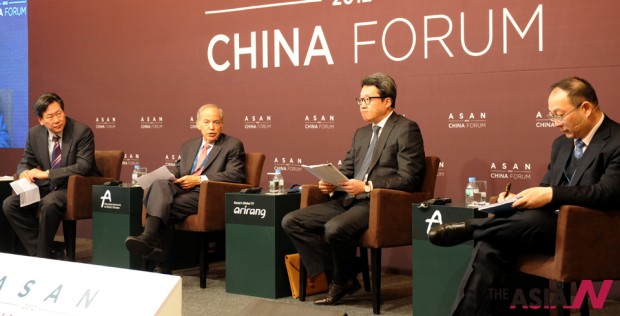“What changes would come to China and Asian countries in Xi Jinping age?”
China in transition
A quiet but meaningful forum was held at a hotel in downtown Seoul at a time when North Korea launched missile and promotion songs for presidential election resound whole nation.
On the occasion of power transition in China, the Asan Institute for Policy Studies hosted a forum under the title of “2012 China Forum: China in Transition” on Dec. 11-12 at Westin Chosun in Seoul amid attendance of some 130 prominent scholars and journalists from South Korea, China, India, United States as well as South East Asian, Central Asian and Middle East countries.
They exchanged heated debate on relationship with China and the future direction of the development. Here are some issues and tasks debated in “China and India,” “China and the ASEAN” and “China and Central Asia” sessions. Participants called for the necessity to institutionalize a channel to discuss sensitive issues such as China-India territorial dispute, Tibet issues and so on.
In “China and India” Session, debaters from India pointed out the China has kept too passive attitude on nuclear issue of Pakistan, Kashmir dispute and so on. Debaters from China retorted that India has to show consistent attitude toward the Tibet issue.
Maj-Gen. YK Gera, researcher of the United Service Institution of India, said “there has been no progress in negotiation about the border dispute. India and China are supposed to maintain close cooperation on economy but two countries have to find solution about statistical issues. China talks of peaceful rising of itself, but actually their attitude seems rather aggressive.”
Prof. Jia Lieying of Beijing Language and Culture University, said that “China-Pakistan issues have long been dealt with. However, it is considered difficult to solve all of those issues at once. Let’s start to talk about the issues such as energy, water, petroleum and so forth two countries are ready to cooperate.”
China should not act as to cause the split of the ASEAN over the territorial dispute of the South China Sea, he continued.
“The China and the ASEAN” session mainly focused on matters concerning the South China Sea. The ASEAN countries failed to be united on the same issue. Cambodia, Laos and Myanmar were favourable to China while Vietnam, the Philippines and Singapore were opposed to it. The 7th ASEAN Summit, held in Cambodia last month, was unable to announce the ASEAN statement on South China Sea issue because of the opposition of Cambodia.
Prof. Hauang Jing of National University of Singapore, said, “it is difficult for ASEAS to keep neutrality under the current situation. The South China Sea issue caused the split of the ASEAN. What matters is Chinese attitude trying to make it an international dispute. Mutual cooperation and multilateral approaches are needed among the countries in the region.”
He further said that the close relationship between Central Asian countries and China may become worse when the democratization of Central Asian countries proceeds. China has long shown interests in natural resources of Central Asian countries such as Kazakhstan, Uzbekistan and so on. With the full-fledged development of West China, China has been in acute need of gas and oil in Central Asian countries. To secure those resources, China has invested massive amount of money on Central Asian countries.
Economically, Central Asian nations and China have been maintaining close relationship but it is highly suspicious whether the current cozy relationship will continue in the years ahead considering the growing interest of Russia, EU and the United States in the region.
Guner Ozkan Usak, researcher at the Center for Eurasian Studies, predicted that “If the wind of Arab Spring blows to Central Asia, it will also influence the energy policy of China.”













































